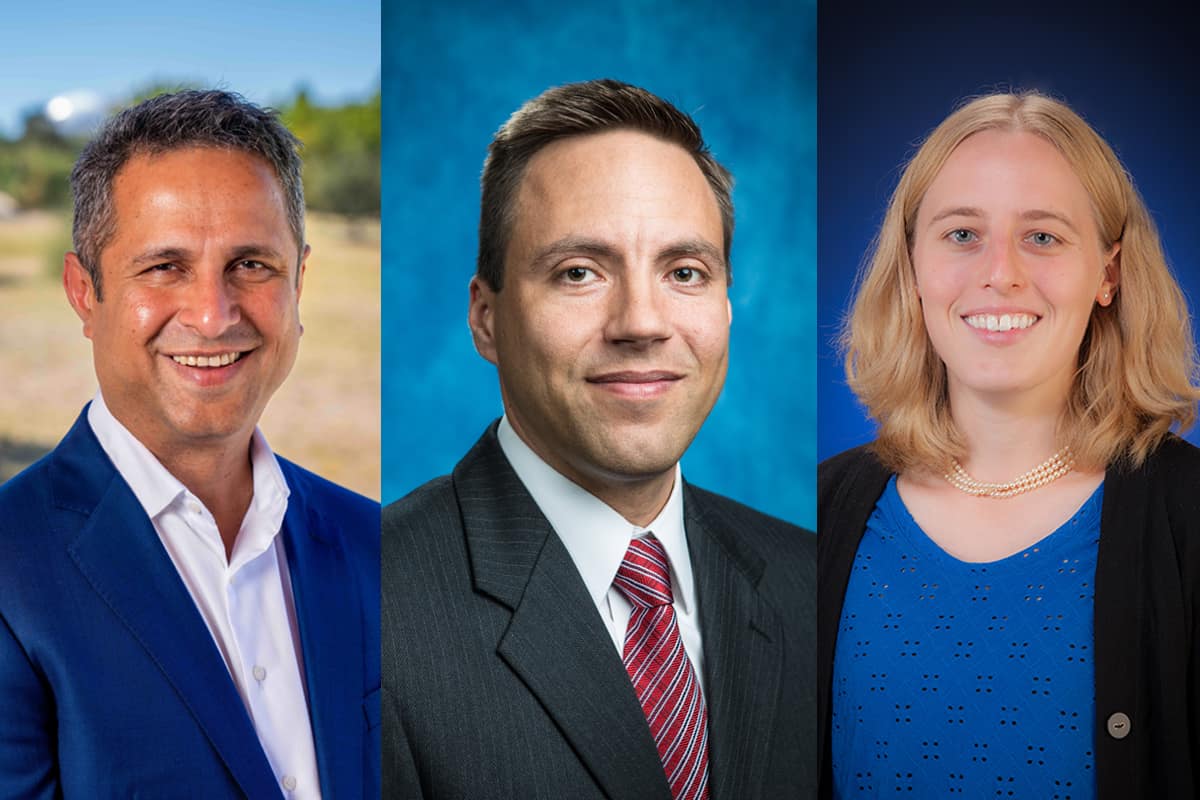Three Embry-Riddle Faculty Named AIAA Associate Fellows for Aerospace Excellence

The American Institute of Aeronautics and Astronautics (AIAA) has named three Embry-Riddle Aeronautical University faculty members to its 2025 Class of Associate Fellows — a designation recognizing significant and lasting contributions to the aerospace profession.
The world’s largest and most prestigious aerospace professional society, AIAA named two Embry-Riddle Aerospace Engineering professors as associate fellows: Dr. Kaela Martin and Dr. Richard Prazenica. The third faculty member named an associate fellow was Dr. Krishna Sampigethaya, chair of Embry-Riddle’s Department of Cyber Intelligence and Security.
“Congratulations to our newest AIAA associate fellows,” said Embry-Riddle President P. Barry Butler, Ph.D. “The election of three of our faculty members to the 2025 class not only fills us with pride but underscores Embry-Riddle’s commitment to fostering top-tier talent and driving innovation in the aerospace field.”
AIAA associate fellows are recognized for “important engineering or scientific work,” “original work of outstanding merit,” or “outstanding contributions to the arts, sciences, or technology of aeronautics or astronautics,” the organization said in its announcement of the 2025 Class.
“Our AIAA associate fellows are visionary leaders whose expertise and dedication have advanced their respective fields,” said Dr. Kelly Austin, the university’s senior vice president for academic affairs and provost. “Such recognition enhances the value of the degrees our students are earning and is further evidence that Embry-Riddle’s aerospace research enterprise stands should-to-shoulder with elite companies and institutions.”
Pioneering Aviation Cybersecurity
Dr. Sampigethaya — the first faculty member from Embry-Riddle’s College of Business, Security and Intelligence (CBSI) to be named an associate fellow — was recognized by AIAA for his “pioneering aviation cybersecurity research,” as well as for “developing countermeasures for aircraft and air traffic control systems.”
During a career that has included roles as Boeing’s first associate technical fellow for aviation cyber-physical security and United Technologies Corporation’s associate director for aerospace cybersecurity, Sampigethaya has worked to safeguard airplanes and air traffic systems from cyberattacks, while also developing innovative solutions that enhance aviation safety.
His current research includes mitigating cyber-physical threats targeting aircraft and investigating how pilots and air traffic controllers are affected by these new threats. He is also leveraging machine learning and other methods to help airlines and their crew respond more effectively to security incidents.
In addition, Sampigethaya has spearheaded project-based learning opportunities for students and training for aviation professionals, including conducting the first in-person training on aviation cybersecurity for the International Civil Aviation Organization (ICAO), the aviation arm of the United Nations. AIAA praised Sampigethaya for “educating future professionals to enhance safety and security in global air transportation.”
“Krishna is a pioneer in aviation cybersecurity, and he is having a direct impact on making our aerospace systems more secure and resilient through his collaborations with industry and government, as well as by providing real-world and hands-on activities with his students,” said Dr. Thomas Drape, dean of CBSI, which is on the Embry-Riddle’s Prescott, Arizona, campus.
Inspiring the Next Generation of Engineers
AIAA honored Dr. Martin, associate professor of Aerospace Engineering at the College of Engineering on the Prescott Campus, for her “innovation and dedication to space educationand AIAA.”
With expertise in education, astrodynamics and satellite dynamics, Martin has completed research projects in trajectory design and engineering education. She spent three years as a visiting researcher at NASA’s Jet Propulsion Laboratory, where her work included computing low-thrust trajectories for cargo missions to support human operations on Mars.
Through a NASA-sponsored grant, Martin designed a Massive Open Online Course (MOOC) on multi-body gravitational dynamics, and she currently conducts engineering education research into differences between experts and novices in problem-solving.
Martin, who joined Embry-Riddle in 2015, said she strives to create learning experiences that motivate students to excel. She was praised by AIAA, where she has served as director of the Young Professional Group, for work that has “ignited curiosity and exploration in the next generation of engineers and space explorers.”
“We are incredibly proud of Dr. Martin for earning this honor,” said Dr. Dietmar Rempfer, dean of the Prescott College of Engineering. “She is the epitome of teaching and research excellence, and is an inspiration to her students.”
Driving Advances in Autonomous Navigation
Dr. Prazenica, interim department chair and professor of Aerospace Engineering at the College of Engineering on the Daytona Beach, Florida, campus, was recognized by AIAA “for important contributions in the areas of guidance, navigation and control of autonomous vehicles.”
His recent research has focused on uncrewed aerial systems (UAS), including enabling vehicles to operate autonomously in challenging environments through vision-aided navigation, obstacle detection and avoidance, and control algorithms.
His research includes a project funded by the Defense Advanced Research Projects Agency (DARPA) to develop autonomous flight control systems for navigating uncrewed aerial vehicles (UAV) in dynamic environments, such as crowded cities or danger zones. Prazenica’s research has also focused on detection systems for UAS to improve operational safety. Other projects include a NASA-funded effort to design an autonomous asteroid exploration flight vehicle. AIAA also recognized Prazenica for his contributions to “nonlinear system identification” and “education in dynamics and control.”
“Congratulations to Dr. Prazenica and the other honorees,” said Dr. Jim Gregory, dean of the Daytona Beach College of Engineering. “Having multiple associate fellows selected by AIAA reflects Embry-Riddle’s leadership in the aerospace community and highlights the importance of the education and research opportunities that our students receive.”
AIAA counts nearly 30,000 individual members from 91 countries, as well as 95 corporate members. New associate fellows must be AIAA senior members in good standing, with at least 12 years of professional experience, and be recommended by three AIAA members.
“The AIAA associate fellows personify the innovation that drives our industry forward,” said Dan Dumbacher, AIAA’s chief executive officer. “The members of the Class of 2025 Associate Fellows embody the ingenuity that is crucial for developing solutions to the complex questions raised across aeronautics, aerospace R&D, and space.”
Embry‑Riddle’s three new associate fellows will be honored at a Jan. 9 ceremony to take place during the 2025 AIAA SciTech Forum in Orlando, Florida.

 Melanie Stawicki Azam
Melanie Stawicki Azam